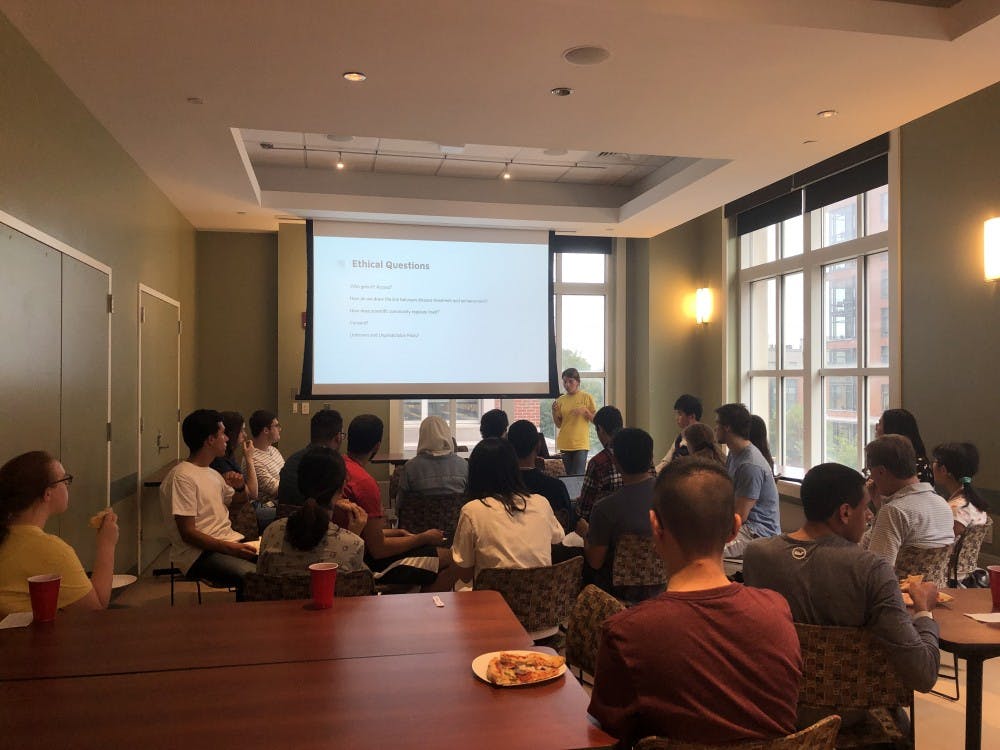The student organization Medical Ethics Discussion Panel (MED Panel) held a discussion about the ethics of gene editing on Monday. The discussion is the first in a series of monthly events organized by MED Panel.
The aim of the monthly discussions is to provide a space for students to hone their skills of formulating and expressing their opinions on contentious issues in health care. Past discussion topics have included the ethics of organ transplantation, modern medical paternalism and universal health care.
The panel began its discussion by clarifying broad issues regarding the ethics of gene editing before considering into more specific applications.
These issues included: scientific regulations of gene editing, informed consent to the procedure, unknown risks, gene therapy versus gene enhancement, allocation of gene-editing technologies and somatic versus germline editing.
Edits in the germline affect future generations while somatic gene edits only affect the individual who undergoes treatment. Some participants argued that germline editing should only be used to treat medical conditions which severely decrease quality of life, like Huntington’s disease.
But others refuted this view. One participant asserted that gene editing would further stigmatize those diagnosed with Down syndrome or autism. Furthermore, another participant claimed that the possibility of editing genes to reverse certain diagnoses can be considered an “insult” to the disabled community who take pride in their identities.
The initial discussion was followed by a conversation about the controversy surrounding He Jiankui’s gene-editing of embryos in China against HIV susceptibility.
To frame the conversation, the participants reviewed ethical guidelines for germline gene editing. One guideline was that gene edits should only be considered as a treatment option if there are no alternatives are viable. Another suggested that edits should only be made to genes which are known to cause or predispose the individual to a disease. Another guideline restricted gene editing treatments to edits which return an afflicted individual to baseline levels, but do not yield any enhancements. Subsequent discussions were framed around case studies.
For the first case study, the participants were asked to consider a couple who learns that their unborn child carries a gene that significantly increases the risk of cancer. The parents consult with a physician and consider the possibility of editing the gene. Although the parents and physician follow all the ethical guidelines, the physician does not know the exact effects of that particular gene edit.
Small groups discussed whether the ethics regarding unknown risks and consent were compromised in this situation. Some believed that it was only mildly unethical since the situation could easily be remedied if the physician treats the embryo by using a known genetic variant.
In contrast, other groups claimed that it was very unethical.
“Because [gene editing] impacts the following lineages, they should not do it because of that consequence. It is a heavy... weight,” a participant said.
Other arguments finding gene editing unethical in this case argued that since cancer is quite prevalent, editing the gene does not eliminate the possibility that the child will develop cancer later in life. According to this argument, since there is no guarantee that the child will be cancer-free even after editing the gene, it may not be worth it to edit the gene in the first place.
The second case study involved a couple who are both carriers of a recessive allele which results in an intense form of bone cancer. In simplified genetic models, there exists two distinct versions, or alleles, of a gene for a particular trait. One allele is ‘dominant’ while the other allele is termed ‘recessive.’ If an individual inherits two recessive alleles for a gene, one from each parent, then they will be affected by the trait which is encoded in those alleles. However, if the individual inherits one recessive allele and one dominant one, then they will not be affected by the trait.
In traditional Mendelian genetics, the likelihood of a couple who are both carriers of the recessive allele having offspring who is affected by the disease is 25 percent.
In the case study, the parents were presented with two options. Since they worried that they worried that they could pass the disease to their offspring, they were advised to use in vitro screening that would detect if a healthy embryo was implanted.
The alternate option presented a novel procedure which would not only ensure that the child would not be afflicted with the illness, but also would strengthen the child’s bones beyond baseline levels. The couple opted for the novel procedure.
The participants debated if gene enhancements like the novel procedure in the case study should be permitted or verges on being unethical.
Some voiced concerns about the unintended consequences of the procedure, including the possibility of recreating other bone diseases. Participants also discussed the unequal accessibility of such a procedure and argued that the technology would only be available to the wealthy.
Others argued that enhancements to bone strength are not cosmetic or attempts to fit the social ideal. Instead, the bone strength is a basic necessity of good health.
Participants considered potential violations of autonomy, and mentioned how the children do not have a choice in their enhancement. However, these points were refuted on the grounds that the consent of a child does not hold as much weight as an adult’s because a child’s brain is not fully developed.
The session concluded with a call for suggestions for next month’s topic. Overall, the discussion cemented the importance of understanding the ramifications and ethics of gene editing technologies and encouraged civil discourse among those with opposing viewpoints.





